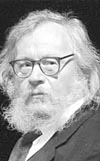|
Raised and Written in Contradiction:
Jan Kott's Final Interview
With Allen J. Kuharski
Transcribed by Helena Morawska White
English Translation by Michal Zadara
English version edited by Allen J. Kuharski
Note: The following text is based
on a series of interviews conducted by Allen J. Kuharski with
Jan Kott at his apartment in Santa Monica, CA, on March 31 and
April 1, 2001. Jan Kott died after a long illness on Dec. 22,
2001.
...
Q:
In the Polish theatre, you knew such directors as Kantor and
Grotowski very well. They were known in Poland as well as abroad,
in America. It must have been a challenge to be friends with
both Grotowski and Kantor.
A: Grotowski
respected Kantor, but Kantor hated Grotowski. I remember Kantor's
last speech at the Congress of Polish Culture in 1981. At that
time it felt like the Soviet Army was going enter Poland any
minute. In that tense atmosphere, standing at the lectern, Kantor
said: "Grotowski is a swindler." That gives you some idea of
the relations between them.
I was in Opole with Grotowski when he was beginning his work.
Back then, in that small theatre, there were three or four people
in the audience. And the actors looked at Grotowski as if he
were God. He demanded incredible things, an unknown kind of
acting. There was a different relation between the actor and
the audience. For Grotowski, acting was like being struck by
lighting--that's my description, but I think that it is appropriate
for Grotowski. Right now, the Center for Research on Grotowski's
work in Wroclaw has published the fourth or fifth incredibly
interesting booklet containing the memoirs of people who worked
with Grotowski in Opole and in Wroclaw. These memoirs are important
if you want to understand Grotowski's relations with his actors.
I will write about it some day. I remember that when I went
to Opole, the performance made a huge impression on me. I knew
that this was new, but I did not then understand the extent
to which this new thing was revelatory, really shocking. Until
I saw Apocalypsis cum figuris for the last time. At that
point, I understood that this is great theatre. That was Grotowski's
last production, one could say that Grotowski's theatrical work
ended there. He later told me and others that for him it was
the end--anything after that would have only been a repetition.
Grotowski was a man of great vision, great courage, unwilling
to make any kind of compromise.
As
I have said, the closeness of the actor and the audience member
was one of Grotowski's principles. In The Constant Prince,
Cieslak was almost tortured on stage, with the audience watching.
Grotowski created Cieslak and ultimately made him unhappy, as
well. I saw in him later on, in Apocalypsis cum figuris.
In the opinion of many besides myself, Cieslak became one of
the world's greatest actors.
...
excerpted from:
New
Theatre Quarterly (2002),
18:103-120 Cambridge University Press Copyright © 2002 Cambridge
University Press DOI 10.1017/S0266464X02000192
In Polish in:
"Wychowany i piszacy w sprzecznosciach: Ostatni wywiad
z Janen Kottem," KRESY
(BORDERLANDS; Lublin) 54-55 (2-3, 2003): 107-123.
|

